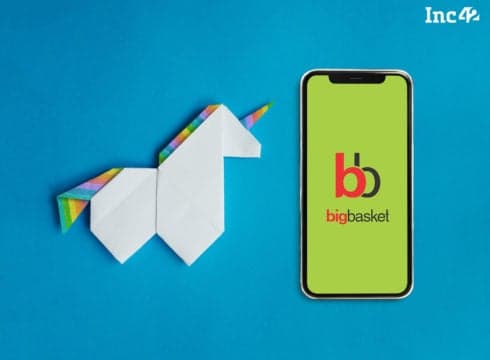The funds will be used for expansion and growth
Till date BigBasket has received funding of $1.02 Bn across 14 funding rounds
In the grocery sector, Flipkart is reportedly in talks to acquire Namdhari Fresh
Inc42 Daily Brief
Stay Ahead With Daily News & Analysis on India’s Tech & Startup Economy
Bengaluru-based hyperlocal grocery startup, BigBasket, has closed its $150 Mn Series F funding round. With the latest round, the company has comfortably crossed into unicorn territory, the first and only online grocer to achieve the distinction in India.
In this round, the company has shares at $114.28571 per share to Chinese ecommerce giant Alibaba, South Korea’s Mirae Asset Global Investments and the UK government-backed CDC Group.
According to the Ministry of Corporate Affairs filings accessed by Inc42, here’s the breakdown of the round:
With this round, the total funding raised by BigBasket has reached $1.02 Bn across 14 funding rounds from investors such as Alibaba, Helion Venture Partners, Bessemer Venture Partners, Abraaj Group, LionRock Capital and others.
The company will use the funds towards growth through further penetration into existing markets with more investments in the first mile, scaling-up of its supply chain and for developing new reseller channels.
BigBasket: The Journey To Unicorn Club
BigBasket was launched in 2011 by VS Sudhakar, Hari Menon, Vipul Parekh, V S Ramesh and Abhinay Choudhari. As an online grocery delivery company, BigBasket claims to have over 10 Mn registered customers and claims to process 1 Lakh orders per day. The company claims to have over 20K products from over 1000 brands and presence in 25 cities across the country.
The company plans to touch $1 Bn gross sales run rate by the end of FY19. It has recorded close to $33 Mn (INR 230 Cr) in gross monthly sales, with an annual exit rate of around $435.8 Mn (INR 3K Cr) in March 2018.
BigBasket has also been putting its efforts to create in-house brands such as Fresho for vegetables and idli and dosa batter; Royal and Popular for staples; Tasties, for snacks will help drive growth going forward. This addition will help BigBasket in becoming self-reliant while other players have to depend on kirana stores for their supply of these products.
Investor Speak
Ashish Dave, head of India Investments for Mirae Asset Global Investments, said, “SGSPL (BigBasket) offers a transformational and convenient experience to its consumers, which makes it a preferred grocery platform. As India moves towards organised retail that offers standardised quality, comfort and speed in the shopping experience, we firmly believe the bigbasket brand will continue to define this segment as a category leader.”
Raghav Bahl, head of India Investments, Alibaba Group said that the company has been working in India to enable local enterprises to grow; in line with Alibaba’s vision of making it easy to do business anywhere.
Srini Nagarajan, managing director and head of Asia at CDC India Advisers, said: “The business’s innovative model progressively addresses these topics, increasing its rate of employment and positively impacting people’s lives such as its network local supplier farmers and workers.”
Struggle Of Grocery Delivery In Hyperlocal Market
The consumer services segments saw a hyperlocal bubble during the 2015-16 period. The combination of ‘me-too’ startups (at the time, there were 400 startups recorded), low margins, as well as losing investor’s trust made more than 100 startups shut shop in the said period.
Among those who lost in the hyperlocal bubble included:
- Flipkart’s grocery delivery division Nearby
- Ola’s food delivery service ‘Ola Cafe’ and grocery delivery service ‘Ola Store’
- On-demand grocery delivery startup PepperTap rolled back its consumer-centric grocery app and pivoted to a full-stack ecommerce logistics company
- Grofers rolled back their operations from several Tier 2 cities to cut down the operational costs.
Now the consumer services segment is again filled with the hyperlocal players which are claiming to ensure there is nothing a consumer can do with a tap on the phone. As the next gen of Indians rely more and more on digital products for ease in their day-to-day activities, grocery delivery has increasingly picked up the pace in the segment.
In the grocery delivery segment, here’s what’s happening:
- Cab-hailing company Ola was reportedly looking to leverage its 125K food delivery riders from its food delivery unit, Foodpanda, for grocery fulfilment.
- Gurugram-based online grocery startup Grofers raised nearly $60 Mn in a fresh Series F funding round from Masayoshi Son-led Softbank Vision Fund
- Flipkart is in talks with Bengaluru-based grocery chain Namdhari Fresh.
- Amazon acquired majority stake in Aditya Birla’s retail chain More
According to a Goldman Sachs report, the Indian online grocery market is estimated to reach $40 Mn (INR 270 Cr) by FY19, growing at a CAGR of 62% from 2016 to 2022. However, in the day and age of on-demand players such as Dunzo and even Swiggy entering the market to fulfill customers’ diverse needs, the expansion and diversification might help BigBasket and the likes to stay relevant.
{{#name}}{{name}}{{/name}}{{^name}}-{{/name}}
{{#description}}{{description}}...{{/description}}{{^description}}-{{/description}}
Note: We at Inc42 take our ethics very seriously. More information about it can be found here.


